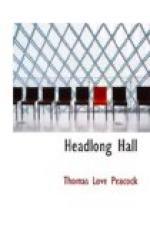Mr Cranium. Very probably.
Mr Escot. You have, of course, found very copious specimens of the organs of hypocrisy, destruction, and avarice.
Mr Cranium. Secretiveness, destructiveness, and covetiveness. You may add, if you please, that of constructiveness.
Mr Escot. Meaning, I presume, the organ of building; which I contend to be not a natural organ of the featherless biped.
Mr Cranium. Pardon me: it is here.—(As he said these words, he produced a skull from his pocket, and placed it on the table to the great surprise of the company.)—This was the skull of Sir Christopher Wren. You observe this protuberance—(The skull was handed round the table.)
Mr Escot. I contend that the original unsophisticated man was by no means constructive. He lived in the open air, under a tree.
The Reverend Doctor Gaster. The tree of life. Unquestionably. Till he had tasted the forbidden fruit.
Mr Jenkison. At which period, probably, the organ of constructiveness was added to his anatomy, as a punishment for his transgression.
Mr Escot. There could not have been a more severe one, since the propensity which has led him to building cities has proved the greatest curse of his existence.
Squire Headlong. (taking the skull.) Memento mori. Come, a bumper of Burgundy.
Mr Nightshade. A very classical application, Squire Headlong. The Romans were in the practice of adhibiting skulls at their banquets, and sometimes little skeletons of silver, as a silent admonition to the guests to enjoy life while it lasted.
The Reverend Doctor Gaster. Sound doctrine, Mr Nightshade.
Mr Escot. I question its soundness. The use of vinous spirit has a tremendous influence in the deterioration of the human race.
Mr Foster. I fear, indeed, it operates as a considerable check to the progress of the species towards moral and intellectual perfection. Yet many great men have been of opinion that it exalts the imagination, fires the genius, accelerates the flow of ideas, and imparts to dispositions naturally cold and deliberative that enthusiastic sublimation which is the source of greatness and energy.
Mr Nightshade. Laudibus arguitur vini vinosus Homerus.[5.3]
Mr Jenkison. I conceive the use of wine to be always pernicious in excess, but often useful in moderation: it certainly kills some, but it saves the lives of others: I find that an occasional glass, taken with judgment and caution, has a very salutary effect in maintaining that equilibrium of the system, which it is always my aim to preserve; and this calm and temperate use of wine was, no doubt, what Homer meant to inculcate, when he said: Par de depas oinoio, piein hote thumos anogoi.[5.4]




